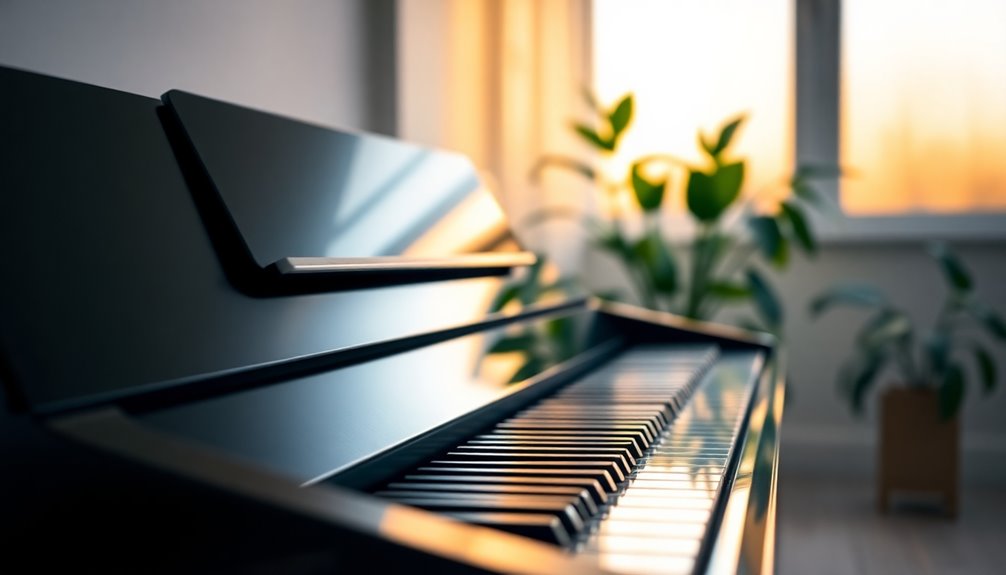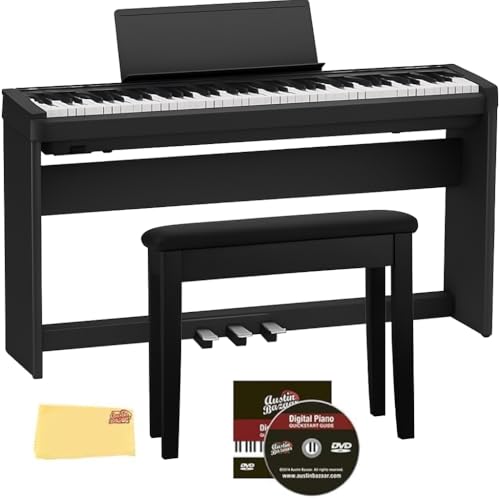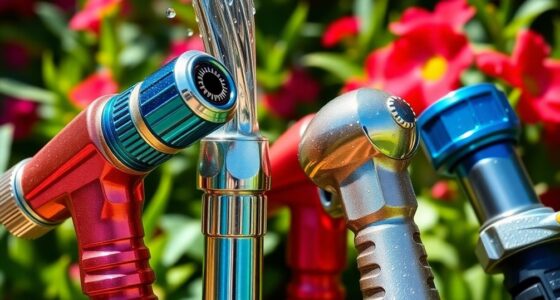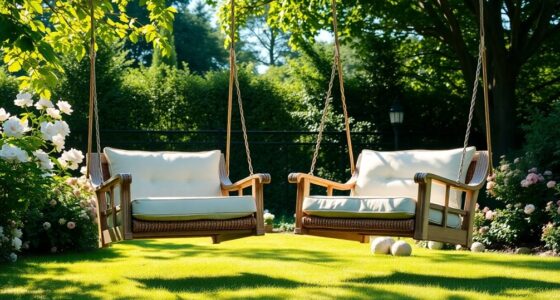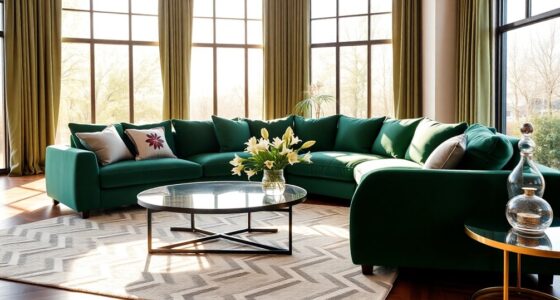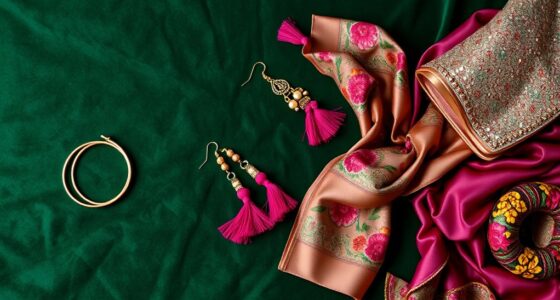If you're looking for the best digital pianos of 2025, you're in for a treat. My top picks combine cutting-edge technology with an authentic playing experience. From the Roland FP-30X's rich sound quality to the Donner DDP-100's portability, there's something for everyone. I love models with weighted keys; they truly mimic an acoustic piano feel. Plus, many of these pianos come with versatile connectivity options, making practice a breeze. You'll find excellent choices whether you're a beginner, casual player, or an aspiring pianist. Stick around to explore the unique features that make these pianos shine!
Key Takeaways
- Look for digital pianos with weighted keys and adjustable sensitivity for an authentic playing experience, ideal for beginners and aspiring pianists.
- Choose models with advanced sound engines, like SuperNATURAL, ensuring rich tones and high polyphony for complex musical passages.
- Prioritize connectivity options such as Bluetooth and USB MIDI to enhance practice efficiency and integration with other devices.
- Consider portability and design; lightweight models with compact dimensions are easier to transport and fit into various living spaces.
- Evaluate price versus performance, aiming for customer-rated models of 4.4 stars or higher, while considering bundled accessories for added value.
Roland FP-30X 88-Key Digital Piano Bundle
If you're looking for a digital piano that combines authentic feel with modern technology, the Roland FP-30X 88-Key Digital Piano Bundle might just be the perfect choice for you. With its SuperNATURAL piano sound engine, it truly captures the richness of an acoustic piano. The PHA-4 Standard keyboard provides a weighted touch that feels amazing under my fingers. I love the built-in Bluetooth support, which lets me connect to learning apps effortlessly. However, I've noticed some users mention issues with the stand's stability and the pedal unit, though the KPD-70 pedal is a step up. Overall, this bundle offers a solid piano experience, but I'd recommend considering the piano separately for the best setup.
Best For: Those seeking a digital piano that offers an authentic playing experience combined with modern connectivity features.
Pros:
- Beautiful design with a rich sound quality that rivals acoustic pianos.
- Weighted keys provide a realistic touch and feel.
- Built-in Bluetooth support enhances usability with learning apps.
Cons:
- Some users report instability with the stand and issues with the pedal unit.
- Speaker performance can diminish at full volume.
- Control features are not intuitive, making adjustments cumbersome.
Donner DDP-100 88-Key Weighted Action Digital Piano
The Donner DDP-100 88-Key Weighted Action Digital Piano stands out as an excellent choice for beginners and casual players seeking an authentic piano experience. With its fully-weighted action, it mimics the feel of a real piano, making practice enjoyable. I love the realistic sound quality, thanks to the 128 polyphony and pure tones sampled from acoustic grand pianos. The compact design fits perfectly in my home, and the aesthetic appeal is a bonus. I appreciate the sliding key cover and volume control, which allows for quiet practice. Although some users mention minor issues with stability and pedal durability, overall, this piano offers remarkable sound quality and a satisfying performance, making it a fantastic investment for anyone starting their musical journey.
Best For: The Donner DDP-100 is best for beginners and casual players looking for an authentic piano experience in a compact design.
Pros:
- Realistic sound quality with 128 polyphony and pure acoustic grand piano tones.
- Fully-weighted action mimics the feel of an acoustic piano, enhancing practice enjoyment.
- Compact and aesthetically pleasing design, ideal for home environments.
Cons:
- Some users report minor stability issues with the stand.
- Durability concerns regarding the pedal's quality.
- May require additional accessories, such as a matching bench, for optimal use.
Vangoa Digital Piano 88 Key Weighted Keyboard
For aspiring musicians seeking a realistic playing experience, the Vangoa Digital Piano 88 Key Weighted Keyboard stands out as an ideal choice. With its advanced sampling technology, it captures the rich tones of an acoustic grand piano, supporting 128-note polyphony for seamless play. The weighted keys mimic the feel of an acoustic piano, making each note responsive and true to life. I love the sturdy wooden cabinet that not only provides durability but also enhances my living space with its retro design. Plus, the connectivity options, including USB-MIDI and dual headphone jacks, make it perfect for both teaching and personal practice. Overall, the Vangoa offers exceptional value, encouraging learners of all ages to engage in their musical journey.
Best For: Aspiring musicians and beginners seeking a realistic and affordable digital piano experience.
Pros:
- Exceptional sound quality with advanced sampling technology and 128-note polyphony.
- Realistic weighted keys that closely mimic the feel of an acoustic piano.
- Sturdy wooden cabinet design that enhances home decor while providing durability.
Cons:
- May be too large for small living spaces due to its dimensions.
- Limited advanced features compared to higher-end digital pianos.
- Some users may require time to adjust to the weighted keys if transitioning from lighter keyboards.
AODSK 88-Key Weighted Hammer Action Digital Piano with Speakers
Looking for a digital piano that feels just like an acoustic? The AODSK 88-Key Weighted Hammer Action Digital Piano delivers that authentic experience. With its full-sized 88-key weighted keyboard, I found it incredibly satisfying to play. Weighing in at 71.2 lbs, it's sturdy yet portable, making it easy to move around. The built-in speakers, along with a headphone jack, let me practice in silence while still enjoying rich sound. Plus, features like multiple tones, recording, and a beginner course make it perfect for learners. Although I had a bit of trouble with assembly instructions, the overall quality and responsiveness impressed me. Rated 4.5 out of 5, it's definitely a great value for anyone starting their musical journey.
Best For: The AODSK 88-Key Weighted Hammer Action Digital Piano is best for beginners seeking an authentic piano experience with supportive learning features.
Pros:
- Authentic feel: Full-sized 88-key weighted keyboard provides a realistic playing experience.
- Versatile features: Includes multiple tones, recording capabilities, and a headphone jack for silent practice.
- Good value: Rated 4.5 out of 5, it offers excellent sound quality and responsiveness for its price.
Cons:
- Assembly challenges: Instructions can be unclear, making assembly a bit difficult for some users.
- Stability issues: Some players report wobbling during use, requiring adjustments for stability.
- Sound quality comparison: While good for beginners, sound quality may not match that of higher-end pianos.
YAMAHA P71 88-Key Weighted Action Digital Piano
If you're seeking a digital piano that offers an authentic acoustic experience, the YAMAHA P71 88-Key Weighted Action Digital Piano stands out as an exceptional choice for both beginners and seasoned musicians. With its touch-sensitive, fully weighted keys, I felt the realistic response that mimics an acoustic piano beautifully. The 10 unique voices, including the Yamaha grand piano sound, allowed me to explore different tones effortlessly. I loved the Dual Mode feature for layering sounds, which added depth to my practice sessions. Plus, its compact design makes it easy to transport, perfect for gigs. With a stellar rating of 4.7 out of 5 stars, the P71 proves to be a reliable companion for anyone serious about their music.
Best For: The YAMAHA P71 88-Key Weighted Action Digital Piano is best for serious musicians and beginners seeking a realistic piano experience in a portable design.
Pros:
- Authentic acoustic feel with touch-sensitive, fully weighted keys that enhance the playing experience.
- Versatile sound options with 10 unique voices, including the signature Yamaha grand piano sound.
- Compact and lightweight design makes it easy to transport for gigs and practice sessions.
Cons:
- Not designed for children or casual play, which may limit its appeal for younger or less serious players.
- Technical setup may be required for certain computers, including driver downloads for proper recognition.
- Limited built-in features compared to higher-end models, which may not satisfy advanced users looking for more functionality.
88 Key Weighted Digital Piano with MIDI Functionality
The 88-key weighted digital piano with MIDI functionality is perfect for both beginners and experienced players who crave a realistic playing experience. With its outstanding sound quality, powered by the French Dream5704 sound chip, I can explore 8 distinct tones and 40 demo songs that make practice enjoyable. The adjustable key sensitivity lets me tailor the response to my playing style, while the dual-tone mode adds versatility. I love the sleek design, which fits seamlessly into my space, and the integrated MP3 player is a fantastic feature for direct playback. Plus, the dual headphone jacks allow for private practice. Overall, this piano offers exceptional quality and functionality, making it an excellent choice for anyone diving into music.
Best For: Beginners and experienced players seeking a high-quality and versatile digital piano experience.
Pros:
- Outstanding sound quality powered by the French Dream5704 sound chip, providing a rich audio experience.
- Weighted keys offer a realistic touch, enhancing learning and playing for users of all skill levels.
- MIDI functionality allows for connection to external devices, expanding creative opportunities.
Cons:
- Some users reported noise issues with the weighted keys, requiring adjustments for optimal performance.
- Setup instructions may lack clarity, particularly regarding audio inputs and MIDI connections.
- Transporting the piano requires two people due to its size and weight, which may be inconvenient for some users.
Fesley Digital Piano 88 Key Weighted Keyboard
For aspiring pianists and seasoned players alike, the Fesley Digital Piano 88 Key Weighted Keyboard stands out with its fully-weighted hammer-action keys that closely mimic the feel of an acoustic piano. Weighing in at 91.6 pounds, it boasts a high-quality wooden cabinet that enhances any room's aesthetics. The upgraded French Dream sound source delivers excellent sound quality, with 380 tones and 256-note polyphony for intricate compositions. Plus, its connectivity options—MIDI, USB, and Bluetooth—make it versatile for modern play. I appreciate the dual headphone jacks for silent practice and the compatibility with piano learning apps like Simply Piano. While assembly can be a challenge, the overall value and performance make it a fantastic choice for any player.
Best For: Aspiring pianists and seasoned players looking for a high-quality digital piano that closely mimics the feel of an acoustic instrument.
Pros:
- Excellent sound quality with an upgraded sound source and a wide variety of tones and rhythms.
- Fully-weighted hammer-action keys provide a realistic playing experience.
- Versatile connectivity options including MIDI, USB, and Bluetooth for modern playing needs.
Cons:
- Heavy unit may require two persons for assembly and can be difficult to align.
- Control panel design is flat and may not be intuitive for all users.
- Some users reported minor defects in materials upon initial assembly.
Roland FP-30X 88-Key Digital Piano Bundle
Looking for a digital piano that combines rich sound and an authentic playing experience? The Roland FP-30X 88-Key Digital Piano Bundle might just be what you need. With its SuperNATURAL sound engine and PHA-4 keyboard, I felt like I was playing an acoustic piano. The built-in 22-watt speaker system fills the room with vibrant sound. While the bundle includes a stand and bench, I found mixed reviews on their stability. However, the KPD-70 pedal unit is a standout. I appreciated the Bluetooth connectivity for learning apps, though changing settings can be a bit tricky. Overall, the FP-30X offers an incredible playing experience, but I'd recommend exploring standalone options for the best setup.
Best For: Those seeking a digital piano that offers a realistic acoustic feel and high-quality sound for practice or performance.
Pros:
- Rich sound quality with the SuperNATURAL sound engine, providing an authentic piano experience.
- Bluetooth connectivity for easy pairing with learning apps, enhancing practice opportunities.
- Weighted keys that replicate the touch and feel of an acoustic piano, improving playability.
Cons:
- Mixed reviews on the stability of the included stand and bench, which may not suit all users.
- Control mechanisms can be convoluted, making it challenging to change settings without an app.
- Speaker performance may struggle at full volume, affecting overall sound quality in larger spaces.
Yamaha 88-Key Slim Digital Piano (P143B)
When seeking an authentic digital piano experience that’s both portable and user-friendly, the Yamaha 88-Key Slim Digital Piano (P143B) stands out. Weighing just 24. 5 pounds and featuring a sleek design, it’s perfect for home use or travel. The premium grand piano sound with stereo-sampled tones truly captures the essence of an acoustic piano. The 88-key Graded Hammer Compact (GHC) keyboard provides a realistic touch, allowing for dynamic expression. With 10 unique voices and Bluetooth connectivity, I can easily integrate this piano with my favorite learning apps. The one-button control makes it a breeze to navigate, and its positive reviews confirm it’s an excellent choice for beginners and hobbyists alike. You won’t regret considering the P143B! Additionally, the Yamaha P143B is not just a great entry-level instrument; it consistently ranks among the best bluetooth keyboards 2025 for its exceptional sound quality and user-friendly features. The built-in metronome and recording functions further enhance practice sessions, making it easier to track progress. Whether you’re a budding musician or a seasoned player looking for a compact solution, this digital piano effortlessly meets all your needs while delivering an impressive performance.
Best For: The Yamaha 88-Key Slim Digital Piano (P143B) is best for beginners, students, and hobbyists seeking an authentic digital piano experience in a portable format.
Pros:
- High-quality sound with premium grand piano tones and stereo sampling.
- Lightweight and compact design makes it easy to transport and store.
- User-friendly features such as one-button control and Bluetooth connectivity for enhanced learning.
Cons:
- Some users report minor noise from keys rubbing together during play.
- The included sustain pedal may not meet the expectations of advanced players.
- Limited to 10 voices, which may not satisfy those seeking a wider range of sounds.
Donner DDP-80 Digital Piano 88 Key Weighted Keyboard
The Donner DDP-80 Digital Piano stands out as an ideal choice for both aspiring musicians and seasoned players who crave an authentic piano experience in a stylish package. With its 88 fully-weighted keys and advanced French DREAM sound source, I feel like I'm playing a true acoustic piano. The 128-note polyphony guarantees that every note rings clear, while the 2x 25W speakers provide a rich stereo sound. Its beautiful retro wood finish fits perfectly in my home, adding an elegant touch to my decor. I appreciate the triple pedal system for enhanced expression, though I wish it had more sound options. Overall, with a solid customer rating of 4.5 stars, the DDP-80 delivers both performance and aesthetic appeal.
Best For: The Donner DDP-80 Digital Piano is best for both aspiring musicians and experienced players seeking a realistic piano experience in an elegant design.
Pros:
- Exceptional sound quality with advanced French DREAM sound source and 128-note polyphony.
- Beautiful retro wood finish that enhances home decor and matches mid-century modern aesthetics.
- Responsive heavy hammer action keys and a triple pedal system for enhanced expression.
Cons:
- Limited sound options may not satisfy users looking for a wider variety of tones.
- No included dust cover for keys, which could be a drawback for maintenance.
- Slightly heavy at 60.9 pounds, making it less portable compared to lighter models.
AODSK Weighted 88-Key Beginner Digital Piano
For beginners enthusiastic to plunge into the world of music, the AODSK Weighted 88-Key Beginner Digital Piano stands out as an excellent choice. It features a full-size weighted keyboard with hammer action and touch sensitivity, which makes playing feel more authentic. With 15W*2 stereo speakers, the sound quality is decent, though it does have a digital feel compared to brands like Yamaha. I appreciate the headphone capability for quiet practice sessions and the 31 preset tones for variety. Weighing about 26 pounds, it's portable, and the minimalist design fits nicely in any space. While assembly can be tricky, the included pedal and MIDI capabilities enhance its value. Overall, it's a fantastic option for hobbyists and casual players alike.
Best For: Beginners and casual players looking for an affordable digital piano with weighted keys and good sound quality.
Pros:
- Full-size weighted keyboard with hammer action and touch sensitivity for an authentic playing experience.
- Includes 31 preset tones and headphone capability for versatile practice options and quiet sessions.
- Lightweight and portable design, making it easy to move and fit in various spaces.
Cons:
- Sound quality may feel digital compared to more expensive brands like Yamaha.
- Assembly instructions can be challenging, leading to potential frustration.
- MIDI capabilities may require additional setup for optimal use with computers.
Weighted Keyboard Piano 88 Keys Electric Piano (SR-EH80)
If you're seeking an authentic piano experience, the Sheirin Weighted Keyboard Piano SR-EH80 is perfect for adults and aspiring pianists. With its 88-key hammer action, it truly mimics the feel of a traditional piano, allowing for expressive performances. The French DREAM series sound source chip delivers rich and authentic piano tones that I find delightful. Plus, it offers various tones, rhythms, and speeds, making practice engaging and dynamic. Setting it up is a breeze, especially with the included instructions and screwdriver. I appreciate the headphone jack for quiet practice sessions, and its compact size fits beautifully in my space. Rated highly by other users, the SR-EH80 consistently impresses with its sound quality and sturdy build.
Best For: Adults and aspiring pianists looking for an authentic and expressive piano experience.
Pros:
- 88-key hammer action keyboard mimics the feel of a traditional piano for enhanced performance.
- Compact size makes it suitable for small spaces and easy to relocate.
- Highly rated for sound quality, sturdiness, and ease of assembly.
Cons:
- Recommended assembly by two people might be inconvenient for solo users.
- Limited to the beige color option, which may not appeal to all aesthetics.
- May require MIDI USB connectivity knowledge for advanced users.
Digital Piano Hammer Action Keyboard 88 Keys Electric Weighted Piano
Looking for a digital piano that feels like a real instrument? The Digital Piano Hammer Action Keyboard is an impressive choice. With its full-size 88-key hammered keyboard, I immediately felt that authentic touch, allowing for expressive performances. The French DREAM series audio chip delivers rich, clear sounds, making my practice sessions truly enjoyable. Its compact design fits perfectly in smaller spaces, and the advanced flip cover keeps it dustproof and stylish. Assembly is straightforward, and I appreciated the included manual. While I noticed some minor issues with key sensitivity, overall, it's a fantastic option for beginners. The built-in foot pedals and lip for sheet music enhance the experience, making it a worthwhile investment for home practice.
Best For: Beginners and home practice enthusiasts seeking an affordable, compact digital piano that mimics the feel of an acoustic instrument.
Pros:
- Full-size 88-key hammered keyboard for an authentic touch and expressive playing.
- High-quality sound reproduction from the French DREAM series audio chip with rich tones and stereo surround sound.
- Compact design with a dustproof flip cover, ideal for small spaces and easy maintenance.
Cons:
- Some users reported key sensitivity issues and unusual sounds from keys after short-term use.
- Aesthetic concerns include visible power cords and logo placement, which may detract from the overall look.
- Lack of a code sheet for instrument sounds can make mastering controls more challenging for beginners.
Donner DDP-90 Digital Piano (88 Key Weighted Keyboard)
The Donner DDP-90 Digital Piano stands out as an exceptional choice for both beginners and intermediate players seeking an authentic playing experience in a compact design. With 88 responsive weighted keys featuring hammer action and an ivory-feel texture, it truly mimics the touch of an acoustic piano. The dynamic sound quality, derived from real acoustic grand piano samples, is impressive, and the 128-note polyphony allows for complex compositions. I love the convenience of the metal triple-pedal system and the headphone mode for late-night practice. Plus, its modern satin black wood body fits perfectly in smaller spaces. Overall, the Donner DDP-90 offers incredible value and is highly recommended for anyone shifting from traditional pianos.
Best For: The Donner DDP-90 Digital Piano is best for beginners and intermediate players looking for an authentic piano experience in a compact design.
Pros:
- High-quality sound derived from real acoustic grand piano samples.
- Responsive weighted keys with hammer action for a realistic touch.
- Compact design makes it ideal for smaller living spaces.
Cons:
- Some users experienced confusion during assembly regarding screws and alignment.
- A few concerns raised about pedal functionality.
- May not have all the advanced features found in higher-end models.
AODSK 88-Key Weighted Hammer Action Digital Piano with Stand and Pedals
For those just starting their musical journey, the AODSK 88-Key Weighted Hammer Action Digital Piano with Stand and Pedals stands out as an excellent choice. Its full-sized keyboard mimics the feel of an acoustic piano, making practice enjoyable and authentic. Weighing 71.2 pounds, it's sturdy yet easy to move, and the included stand and three pedals enhance your playing experience. With 128 polyphony and a variety of sounds, I found it perfect for exploring different musical styles. The headphone jack allows for silent practice, which is a huge plus. Plus, the 30-day beginner course supports new learners. While assembly can be tricky, the overall value for sound quality and key responsiveness makes it a great investment for beginners.
Best For: The AODSK 88-Key Weighted Hammer Action Digital Piano is best for beginners looking for an authentic piano experience with supportive learning features.
Pros:
- Authentic feel: Full-sized weighted keys provide a realistic playing experience.
- Versatile sound options: Includes 128 timbres and 88 demonstration songs for musical exploration.
- Silent practice: Headphone jack allows for quiet practice sessions without disturbing others.
Cons:
- Assembly challenges: Instructions may lack clarity, making setup potentially confusing for some users.
- Stability issues: Some users report wobbling during play, indicating a need for stability adjustments.
- Sound quality limitations: Compared to higher-end pianos, sound quality may not meet the expectations of more experienced players.
Factors to Consider When Choosing Digital Pianos

When I'm choosing a digital piano, I always think about sound quality first—nothing beats a rich, authentic tone. I also consider how the keys feel under my fingers because that can make or break my playing experience. Finally, I look at portability and connectivity options to guarantee it fits my lifestyle and setup.
Sound Quality Importance
Choosing a digital piano often hinges on sound quality, as it directly influences your playing experience. I can't stress enough how vital it is to look for models that utilize advanced sound engines. These engines replicate the nuances of acoustic instruments, making your music come to life. One key factor to take into account is polyphony; a higher count, like 128 or more, guarantees that complex passages play smoothly without notes dropping out, which enhances the richness of your performance.
Additionally, features like reverb and chorus effects can elevate sound quality, creating a more immersive auditory experience. You'll also want to check the speakers. A decent wattage, such as a 22-watt system, is essential for delivering clear, room-filling sound—important whether you're practicing or performing.
Finally, sampling technology plays a significant role in sound quality. Look for digital pianos that use multiple recordings at different velocities. This capability produces a more realistic and expressive sound, allowing you to convey your musical emotions more effectively. Investing in a digital piano with excellent sound quality truly enhances your overall experience and connection to the music you create.
Key Action Feel
Although many aspects of a digital piano can enhance your playing experience, the key action feel is essential for truly capturing the essence of acoustic performance. When I play, I appreciate weighted keys that mimic the resistance of acoustic piano hammers. This feature offers an authentic experience that's hard to beat. Fully-weighted keys are especially important for serious learners like me, as they help develop the finger strength and technique needed for acoustic playing.
I also find it beneficial to reflect on graded hammer action, where the bass keys feel heavier and the treble keys lighter, similar to an acoustic piano's touch. This design truly enhances my playing experience. Furthermore, I've noticed that key sensitivity can vary across models. Some digital pianos allow for adjustable sensitivity, which lets me match the keys to my unique touch and playing style.
User feedback consistently highlights the importance of key action feel. Personally, I can attest that it greatly impacts my comfort and ability to express dynamics. When choosing a digital piano, prioritizing key action feel can elevate your playing and help you connect with the music more deeply.
Connectivity Options Available
After enjoying a satisfying key action feel, I realize that connectivity options can greatly enhance my digital piano experience. Many models come equipped with Bluetooth, letting me connect wirelessly to learning apps and other devices. This feature is particularly useful for practicing and expanding my skills without the hassle of cables.
I also appreciate the presence of auxiliary inputs and outputs. They allow me to connect external speakers for enhanced sound quality or headphones for private practice. Being able to immerse myself in the music without disturbing others is a game-changer.
USB connectivity is another important aspect. It facilitates direct connections to my computer, tablet, or smartphone, making it easy to record, edit, and utilize music software. MIDI functionality is often included as well, which means I can communicate with other MIDI devices and software, expanding my creative possibilities in music production and performance.
Lastly, the dual headphone jacks are a thoughtful addition. They accommodate both me and a teacher or companion, enabling us to practice together without disrupting anyone nearby. Overall, these connectivity options greatly enrich my digital piano experience.
Portability and Weight
When I think about digital pianos, portability and weight are essential factors that can really impact my playing experience. For instance, I love the Yamaha P71, which weighs just 25 pounds—super easy to transport. On the other hand, heavier models like the Roland FP-30X, at around 95 pounds, can be quite unwieldy. If I'm tight on space, compact designs like the Donner DDP-100, measuring 54.33 inches wide and 16.14 inches deep, are fantastic options.
I've found that many digital pianos come with features designed for easy assembly and transport, such as convenient handholds and lighter components. This makes moving them between locations a breeze. However, I need to be cautious with wooden cabinet models, as they often provide a sturdier build but can sacrifice portability due to their weight.
Another consideration is whether the digital piano includes a detachable stand or has a lightweight design. These features can make a significant difference in how easily I can set up or pack away my instrument. Ultimately, finding the right balance between portability and performance is key for my playing journey.
Built-in Features and Functions
As I explore digital pianos, I quickly realize that built-in features and functions can greatly enhance my playing experience. For instance, having multiple voices and tones allows me to experiment with my music, and some models offer an impressive 380 tones and 128 rhythms. This versatility encourages me to try out different styles and genres.
Connectivity options like USB MIDI and Bluetooth are game-changers too. They let me integrate my digital piano with various learning apps and software, making practice much more effective. I also appreciate sound quality enhancements, such as 128-note polyphony, which prevents any note dropouts during complex passages.
User-friendly functions like metronomes and recording capabilities are essential for honing my skills. Some models even support teaching modes, which are great for learning. Plus, the presence of headphone jacks lets me practice silently, so I can play whenever I want without disturbing anyone around me.
Design and Aesthetics
Choosing the right design and aesthetics for a digital piano can truly transform your playing experience. When I shop for a digital piano, I always consider how it'll fit into my home decor. Whether I prefer sleek, compact styles for smaller spaces or a traditional wooden cabinet for that classic look, the design matters.
Weight and dimensions also play an essential role; I've found that heavier models often provide a more stable playing experience, but they can be a hassle to move. I want to make sure my piano not only sounds great but looks appealing as well. Aesthetics can greatly influence my satisfaction, especially when I find a model that resembles an acoustic piano.
I pay attention to key cover features too, like sliding or flip designs that protect keys from dust while enhancing visual appeal. Finally, the finish—whether lacquered or matte—affects both durability and the overall impression it leaves in my living space. By thoughtfully considering these elements, I can find a digital piano that not only serves its purpose but also adds beauty to my environment.
Assembly and Setup Ease
While setting up a digital piano might seem straightforward, several factors can make the process smoother or more challenging. For starters, some models are quite heavy and often require two people for assembly. Thankfully, many can be set up in less than 30 minutes if you've got a buddy to help.
Clear assembly instructions are a game changer; I've encountered manuals that left me scratching my head, which can lead to unnecessary frustration. Having the necessary tools, like screwdrivers, included in the package really simplifies things and saves you a trip to the toolbox.
I've noticed that stand stability can be hit or miss. Some stands wobble during play and can require a bit of adjustment to get right. If you're tight on space or plan to move your piano often, opting for a compact design will make assembly and transport much easier.
In the end, considering these factors can help you avoid potential headaches and focus on what really matters—playing and enjoying your new digital piano!
Price and Value Consideration
When it comes to selecting a digital piano, understanding the price and value considerations can greatly impact your decision. I've found that digital pianos range from a few hundred to several thousand dollars, so establishing a budget before diving in is essential.
As I compare models, I always consider the features offered in relation to the price. More expensive options typically come with advanced sound engines, better key action, and extra functionalities that can enhance my playing experience. Customer ratings also play a big role in my choices; I usually look for products rated 4.4 out of 5 stars or higher to guarantee a good balance of price and performance.
I also pay attention to bundled accessories like stands and pedals. Sometimes, buying these separately can save money, especially if I find higher-quality options. Finally, I evaluate the warranty and customer support. A solid warranty can really enhance the perceived value of a digital piano by protecting me against defects. By keeping these factors in mind, I feel more confident in my decision-making process.
Frequently Asked Questions
What Is the Best Digital Piano for Beginners?
When I started learning the piano, I found that a good digital piano made all the difference. For beginners, I recommend looking for one that has weighted keys, built-in learning tools, and a variety of sounds. I loved my first digital piano because it offered a realistic feel and was user-friendly. It's important to choose something that inspires you to practice regularly and enjoy the journey of learning music!
How Do I Maintain My Digital Piano?
Maintaining my digital piano feels like caring for a cherished plant. Just like I water it regularly and guarantee it gets enough sunlight, I keep my piano clean and dust-free. I wipe the keys with a soft cloth and avoid placing drinks nearby. I also check for software updates to enhance its features. By treating my piano well, it brings me joy and inspiration every time I play. What about you?
Can Digital Pianos Simulate Acoustic Piano Sounds?
Absolutely, digital pianos can simulate acoustic piano sounds quite effectively. I remember the first time I played one; the realism blew me away! These instruments often use advanced sampling techniques, capturing the nuances of real pianos. They can mimic everything from the subtle touch of keys to the resonant tones of strings. If you're looking for a realistic experience, I'd definitely recommend trying out a few models to find the sound that resonates with you.
Are Digital Pianos Suitable for Professional Performances?
Oh sure, because nothing screams "professional" like a keyboard that plugs into the wall! But seriously, I've found digital pianos can absolutely shine in professional performances. They offer versatile sounds, portability, and features like recording and connectivity that acoustic pianos can't match. I've played gigs where my digital piano's effects added that extra flair to my performance. So yes, they're not just toys; they're serious instruments for any professional musician!
What Accessories Are Essential for Digital Piano Players?
When I play my digital piano, I find a few accessories really important. First, a good-quality stand keeps my instrument stable. I also can't live without a comfortable bench; it helps me maintain proper posture. Headphones are vital for practice sessions, letting me play without disturbing anyone. Finally, I always carry sheet music or a tablet with my favorite pieces. These accessories enhance my playing experience and keep me focused and inspired.
Conclusion
In wrapping up, choosing the right digital piano can truly enhance your playing experience. Did you know that nearly 80% of piano students say they prefer digital pianos over traditional ones for their versatility and features? With options like the Roland FP-30X and Donner DDP-100, you've got incredible instruments at your fingertips. So, whether you're a beginner or a pro, there's a perfect digital piano waiting for you to express your musical potential!
